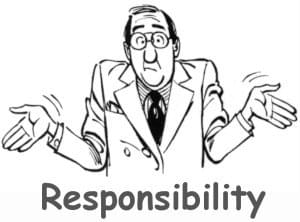Who is Responsible for the Quality of a Hire?
 A few weeks ago I found myself in a meeting with a customer that ended up turning into one of those brilliant “are we sure we’re not all having a few beers here” chats about what roles we all play (or should play) in solving the world’s insatiable demand for talent. We quickly ended up asking ourselves “just exactly who is responsible for quality of hire in an organisation?” and do you know what, it’s actually not an easy question to answer.
A few weeks ago I found myself in a meeting with a customer that ended up turning into one of those brilliant “are we sure we’re not all having a few beers here” chats about what roles we all play (or should play) in solving the world’s insatiable demand for talent. We quickly ended up asking ourselves “just exactly who is responsible for quality of hire in an organisation?” and do you know what, it’s actually not an easy question to answer.
We begun our conversation by asking ourselves exactly what outcomes and behaviours can and should we measure in a recruiter and what “good” looks like, i.e. what benchmarks should we use to measure their performance. I’m a huge advocate of taking a scientific (aka quantitative) approach to recruiting when it comes down to variables that can be measured and improved upon with training and/ or process improvement. It is very possible to benchmark something like number of hires in X period, implement a better process or improved training/ coaching and see a quantifiable increase in that measurable. What is less quantifiable is a metric such as quality of hire and it gets even “fuzzier” when you try to pinpoint specific behaviours or a process that can be altered/ replaced so as to improve the original metric. Under-performing employees can be a massive drain on any business and the opportunity cost of not having a “star” in their stead is even greater. There are two sides to this same hiring coin: who can we blame for the poor hires and who can we rely upon to ensure that we are hiring more stars? Well, let me present to you  the candidates up for contention:
the candidates up for contention:
- The Hiring Manager
- The Recruiter
- The Head of HR/ Talent
Let’s take a look at the case for and against each of these candidates:
The Case for The Hiring Manager:
Ultimately, the hiring manager is the person who makes the decision to hire someone. They draw up the person spec, decide on the skills and experience required and are then presented with a shortlist of candidates whom they interview, assess and narrow down to the person they’re happiest with. After confirming to themselves and their colleagues that they have matched the original requirement (that they drew up), they pull the trigger, they make the final decision so therefore shouldn’t we hold them responsible?
The Case for the Recruiter:
If there is meant to be a “hiring professional” in the mix here, isn’t it the recruiter? After all, it’s their job to understand all of the requirements, advise the hiring manager on what the market has to offer, go to market to find such a person and ensure that they have been tested and reference checked before they get through to offer stage? If the requirements brief is incomplete or unsatisfactory should we not expect the recruitment professional to raise a red flag? Aren’t they the masters of interviewing and assessment; the last line of defence?
 The Case for the Head of HR/ Talent:
The Case for the Head of HR/ Talent:
Someone is ultimately responsible for Talent in an organisation and that person is usually the head of human resources (or talent acquisition or whatever you’re calling your Personnel Director these days!). If the hiring process is broken, surely we need to look at the person who designed this process in the first place? If candidates are failing due to a skills deficit, isn’t it the HRD’s responsibility to either enforce a more stringent assessment process or to provide better support and training for struggling new starters? If it’s a culture fit issue, shouldn’t the HRD be better defining what exactly is your culture and ensuring that recruiters and hiring managers alike are singing off the same hymn sheet?
All valid arguments, you might agree; and as I write them I’m starting to convince myself that all three parties are to blame but that’s not really helping anyone is it? To say that everyone is to blame in their own way is to shirk the responsibility away from any one person leaving us with a situation where we’re forced to just accept that the system is broken and is unlikely to be fixed anytime soon. Let me step back in to defend each of the accused:
The Case Against the Hiring Manager:
First of all, “Hiring Manager” is not a job title. The person who makes the decision on who to hire will have some other title such as “IT Manager” or “Financial Controller” or “Operations Director”. They are not a trained professional in “Hiring” like the job title we ascribe to them would suggest. Their expertise is in doing whatever the heck they do day to day, which I guarantee you is not recruiting. They are likely managing a team or department because that’s what they’re good at; leading people, getting the most out of good staff. The fact of the matter is that sometimes you get some rotten eggs. There is no chef in the world who can turn rotten eggs into a beautiful omelette. You cannot blame someone for a hiring mistake (nor, to be fair, credit them exclusively for the great hires) when their core job is not making hiring decisions. End of.
 The Case Against the Recruiter:
The Case Against the Recruiter:
Yes, this is the professional representing all of the world’s best practice sourcing, assessment, interviewing and selection skills but how is their performance measured? How do you remunerate them? I guarantee that it’s on a combination of metrics such as cost of hire, time to hire and source of hire (if anything at all!). I guarantee that it is NOT quality of hire. If you pay your recruiters to find talent at the lowest possible cost and as fast as possible, what do you expect? When staring at a potential candidate, ask yourself whether the recruiter is likely to think “can I do better?” or “yup, they tick the box, let’s get them in front of the hiring manager ASAP”. If you give your dog a treat every time he catches the ball, don’t blame him when the ball comes back all covered in doggy slobber!
The Case Against the Head of HR/ Talent:
So the buck has to stop with someone and that person is the person in charge of Hiring but the best assessment process in the world still requires subjective judgement on behalf of the recruiter and the line manager, neither of which the HRD can control every time for every role. Also, most companies talk about Talent being their number one objective but the HRD is often the least influential board member when it comes to operational or strategic decisions. If Talent was really that important, the COO would be responsible for it. In fact, it would be her main job as no operation can run without people (to design, support, manage and sometimes to just do it; whatever “it” is). Stop cutting the training budget; invest in better systems and involve your HRD in real decisions that count. If people are required to design, build and execute a product or service strategy, then the person in charge of people needs to be involved at the start. Don’t design a product or service that can’t be delivered with the resources available in the current market of talent. Involve the HRD in the design so that you understand the available (or potentially available) inputs.
My two cents:
If you are going to assign blame or credit or if, more specifically, you want to better identify inputs (read: recruitment processes) that can be modified to control your outputs (read: performance of your staff) then you need to figure out what you need to measure and what you can measure (they are not always the same!). Next you need to make sure that everyone’s goals are aligned and that this is reflected in their performance reviews and remuneration. Nothing motivates  better than a common, clear and measurable goal (oh, and cash too). If a recruiter knows that her next performance review is going to be focused on how her candidates have performed since joining the company, she will think twice before recommending someone whom she suspects may not be a good skill or cultural fit for a role. Also, she will know that it’s more important to perhaps spend some money (use an agency, run an ad, etc) to find the “best” candidate than just settle for the first person we find that meets or comes close to the spec. The hiring manager needs to be given the skills and support to better assess candidates and to be involved in a feedback loop wherein they can learn from the experience of other great hires or bad hires that the company has made. The best process is an iterative one that takes feedback and constantly improves with better data. The Head of Talent/ HR needs board level support and resources to really put “Talent” at the heart of the business. I don’t care whether you call that person a HRD or COO; titles dont matter, but the person responsible for bringing in and retaining people in your organisation needs to be a serious player with serious support. Hire a monkey or treat someone like a monkey and you’ll get what you deserve.
better than a common, clear and measurable goal (oh, and cash too). If a recruiter knows that her next performance review is going to be focused on how her candidates have performed since joining the company, she will think twice before recommending someone whom she suspects may not be a good skill or cultural fit for a role. Also, she will know that it’s more important to perhaps spend some money (use an agency, run an ad, etc) to find the “best” candidate than just settle for the first person we find that meets or comes close to the spec. The hiring manager needs to be given the skills and support to better assess candidates and to be involved in a feedback loop wherein they can learn from the experience of other great hires or bad hires that the company has made. The best process is an iterative one that takes feedback and constantly improves with better data. The Head of Talent/ HR needs board level support and resources to really put “Talent” at the heart of the business. I don’t care whether you call that person a HRD or COO; titles dont matter, but the person responsible for bringing in and retaining people in your organisation needs to be a serious player with serious support. Hire a monkey or treat someone like a monkey and you’ll get what you deserve.
Quality of Hire is hugely important. In a world where even traditionally commoditised labour markets like India and China are moving up the value chain, the differentiator for a business is going to be their people. People design great products, they invent new ways of doing things, they build architecturally beautiful and structurally sound bridges, they answer calls from customers and they hire more great people. Start by investing in the people who hire your people. You can’t go wrong there.
What are your thoughts? Who do you think is responsible? Let us know in the comments.
